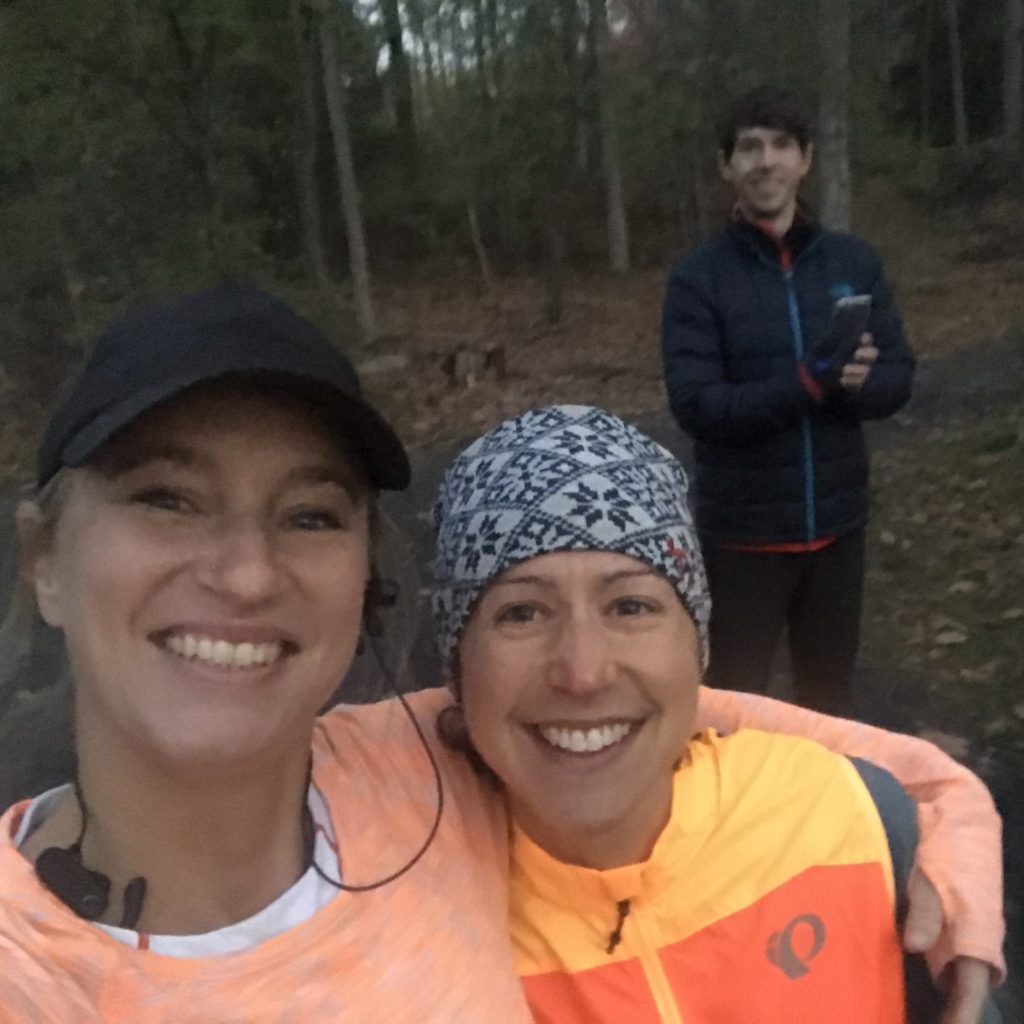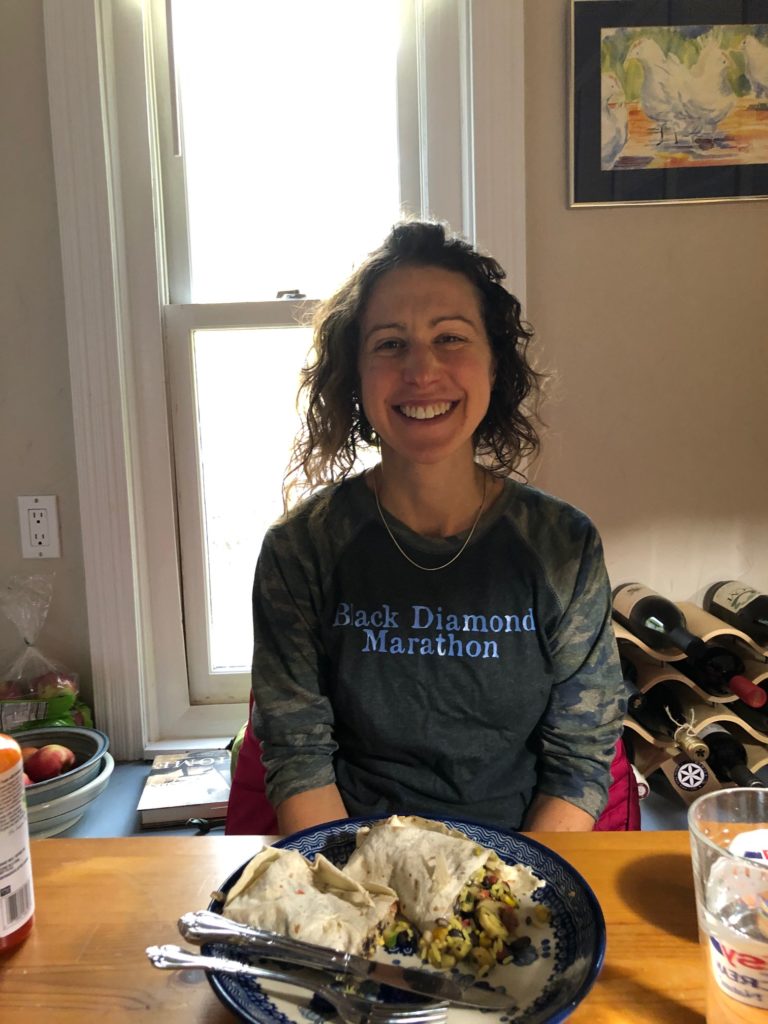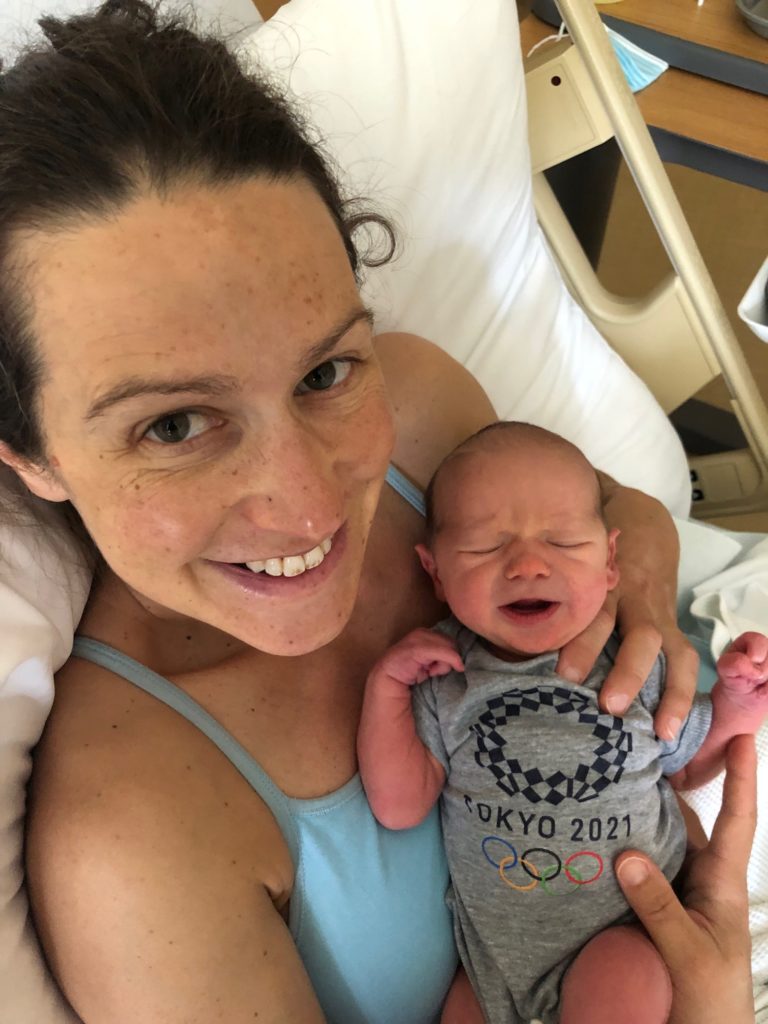Olympian mothers
On October 18, 2020, I ran a marathon. The Black Diamond Marathon, we called it.
It was not official. There were only two people entered — my friend Caroline and myself. And the course, measured to 26.2 miles on Ithaca’s Black Diamond Trail with my bike’s odometer, turned out to be at least 300 yards too long.
We had a good time. Caroline, the mom of toddler twins, rocked her marathon debut, and I ran a PR of 3:49:17, beating my 29-year-old self.

But even though I’d been training hard for months, I didn’t finish in my goal time of 3:38:00. The long course was a factor. Another reason was that my period had just started, which hampers my energy every time.
It turns out that that menstrual cycle that slowed me down in my most recent marathon also triggered an even more remarkable event in my life; it was the very beginning of my new role as a mother.
The medical world measures pregnancy — about 40 weeks — starting with the first date of the last period before implantation. That, for me, was October 17 or so. So technically, I can say that I ran a marathon while pregnant. And it confirms something to me: that my body was in the best possible shape of my life in all ways, not just athletically, at the end of a marathon training cycle.

Every Saturday after I found out I was pregnant, I ticked another week off on my calendar, counting from about October 17 – and I thought about that marathon.
You started with a 26.2 mile run.
On July 22, 2021, I gave birth to Paul. The next day, the Tokyo Olympics began.
Barely able to crawl out of my bed and stand up straight, I watched a few events on the hospital room TV. I struggled to nurse Paul in the late hours of a restless, painful evening while watching the 4×100 meter relay in swimming.
It was like watching a scene from heaven. In the brightly-lit aquatic center, a few dozen tall, lean superhumans dove, swam and cheered for each other, throwing off waves of physical perfection. They were not just on the other side of the planet, swimming into tomorrow in Japan — they were in another reality. They skimmed over top of blue water while I was drowning in a hospital bed.
The Australian team won the race. And at the pool’s edge, four statuesque, amphibious women celebrated in tight, green skins. Goddess bodies, so far away from me in my hurting, draining body.
But in that moment we shared something: exhaustion. And also exhilaration.

Through my pregnancy, childbirth (by C-section; it’s complicated) and now into recovery, I can’t help but compare motherhood, a heavily physical endeavor, with athletics. And even though giving birth has temporarily laid me low physically, this experience gives me common ground with athletes — those beings who depend on cycles of physical preparation, exertion, depletion, and recovery.
Moreover, I now share particular common ground with an emerging class of professional athlete: the Olympian-mother.
This year more than ever before, elite athletes who are also moms have been speaking out and acting out on being both.
The story I’ve followed most closely is that of Aliphine Tuliamuk, who won the US Olympic marathon trials in February 2020 — days before the pandemic shut down the world and postponed the 2020 summer games. Aliphine and her partner, Tim, bravely decided to try for a baby during the year-long delay. Their daughter, Zoe, was born in January 2021. Aliphine has been recovering from the birth AND preparing for an Olympic marathon appearance ever since.
Rather than hiding how difficult childbirth and recovery have been, she’s been quite vocal in social media about the physical realities she’s facing. Now, just days before her Olympic appearance, Aliphine is optimistic and says she’s prepared.
As I read her posts just days after I’d given birth, I marveled that she (or anyone!) can run a few steps after this experience, let alone 26.2 miles at a ~5:30 pace.
Allyson Felix, who is running the 400 meters in her fifth Olympics this week, appeared at the June US trials with her toddler, Cammy. I’d known that Felix has spoken out for better treatment of professional runners by sponsors during pregnancy. But a few days after I gave birth, Caroline, my fellow Black Diamond marathoner, reminded me of the circumstances of Cammy’s birth: An emergency C-section at 32 weeks followed by a frightening stay in the NICU.
A few days ago, Allyson posted: “When you see me on the track I hope you understand my fight. As an athlete who was told I was too old, as a woman who was told to know my place, as a mother who wasn’t sure I would live to raise my daughter. I hope you see that for me, it’s about so much more than what the clock says.”
Another Instagram image shows Allyson wearing her medals from previous Olympics, which hang above her C-section scar. This image, sent to me by Caroline, started me on the road toward loving and caring for my own C-section incision, which now looks like an ugly road bump. I share this with an Olympian-mother.
And there are others:
–Elite marathoner Sara Hall is challenging the American marathon record while raising her four adopted daughters, all sisters.
–Jamaican sprinter Shelly-Ann Fraser-Pryce feared her career was over in 2017 when she became pregnant. Instead, she became the oldest person to win an individual Olympic sprint this week, taking a silver in the 100 meters. Formerly known as “Pocket Rocket” for being speedy and short, Shelly-Ann now proclaims herself the “Mommy Rocket.”
–Heptathlete Lindsay Flach competed in the US Olympic track and field trials in June while 18 weeks pregnant. “It was hard mentally because I knew I wasn’t going to be able to compete at the level I was capable of 18 weeks ago,” she said, “but I just wanted to prove what women are capable of.”
–I was astonished in 2016 to watch gymnast Oksana Chusovitina compete in yet another Olympic games. (she won a silver medal in vault in the 2008 Olympics at the age of 33) AND to learn during that broadcast from Rio that she is a mother; her son was born in 1999. I remember watching her compete as a teenager in the 1992 Olympics! Oksana Chusovitina is a part of a very small group of gymnasts who return to international competition after becoming mothers. She retired at age 46 – unheard of in a sport that prizes prepubescent female bodies.
–And while I was pregnant and asking the internet whether I should continue to do flip turns during my swimming workouts, I discovered that American swimmer Dana Vollmer, a seven-time Olympic medalist, competed at an elite level while six months pregnant. She kept it in perspective: “As hard as people think this is, the race is only 30 seconds long as opposed to the entire day I spend holding and chasing around a 35-pound two-year-old,” said the mother of two. “This will feel like a break.”
Elite female athletes are not just slighter, curvier versions of men. By pushing to normalize motherhood in a field where they depend on physical well-being, these women and others are proving that women capable of producing world-record speed, height and agility are also, within different eras of the same lifetime, capable of producing new life.
My husband brought presents to the hospital for both Paul and me. Paul got a Tokyo Olympics onesie, which looks adorable as he cries during his second day of life. And I got a new pair of running shoes — equipped with spring plates. These trainers are not just for jogging, but for speed-building interval workouts. Bill trusts that I’ll get back to pushing what “best” means for me, and I am gaining confidence in that, too.
I’m currently feeling soft and slow, but I have hope. I’ll never be an Olympian, but I am a mother. And more, I started that journey as a mom with one of my personal best athletic performances. I trust that the physical well-being that brought me so many good things, most of all my son, will continue through this new phase of life.